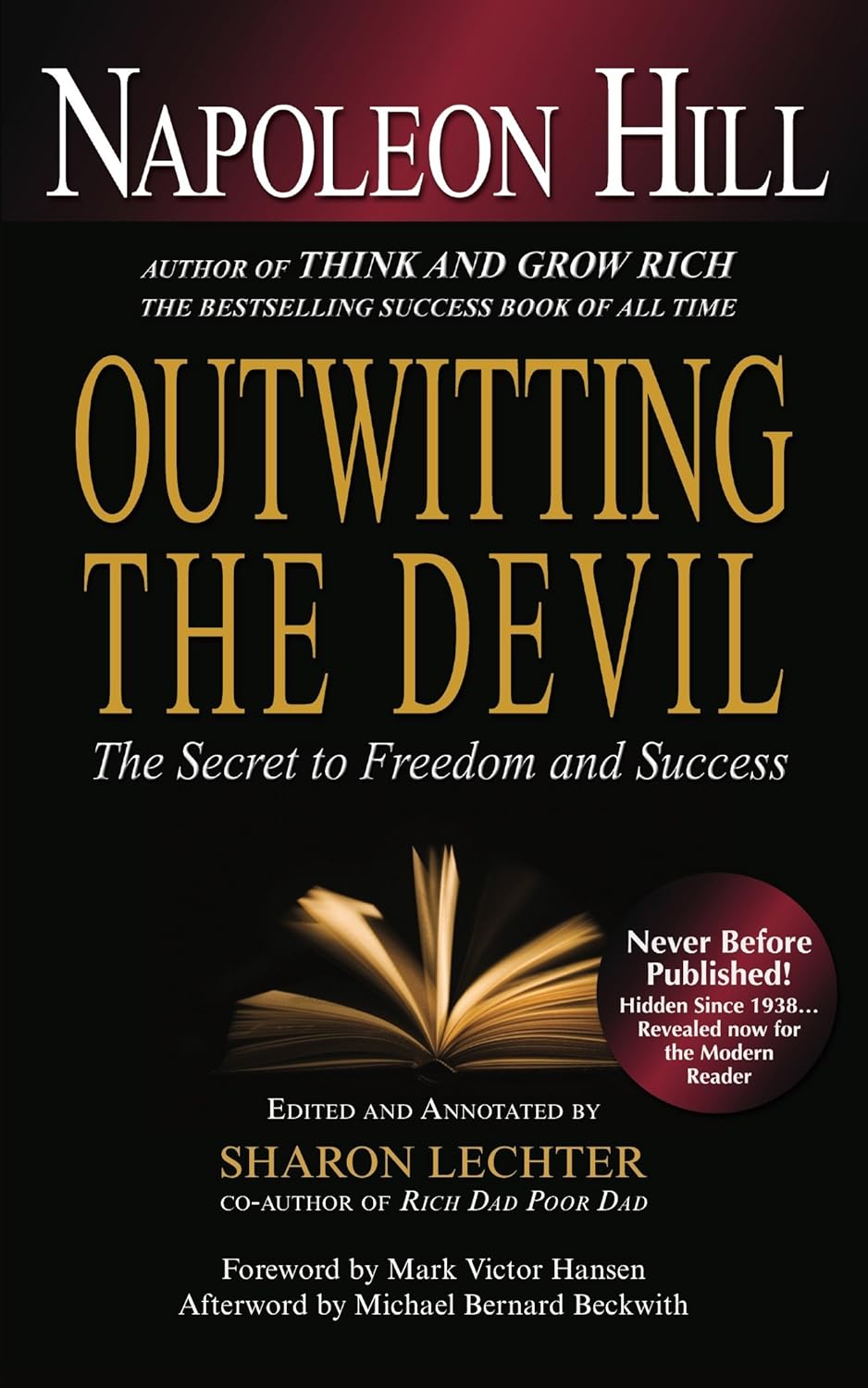Unleashing Purpose and Self-Discipline: Insights from “Outwitting the Devil” by Napoleon Hill 🚀📘
Hey there, everyone!
Deepak here, and I’m thrilled to dive into another captivating book with you today. The book of the day is none other than Napoleon Hill’s “Outwitting the Devil.”
This morning, I delved into a chapter that got me pondering the concept of faith as a definiteness of purpose.
Let’s explore this idea and more from the book.
Faith as Definiteness of Purpose
The notion of faith being tied to a definiteness of purpose struck a chord with me.
Essentially, this concept emphasises the importance of having a clear and unwavering sense of purpose, which, in turn, provides you with a strong sense of direction in life.
I believe this faith extends beyond the religious context, encompassing faith in a higher sense of purpose—a purpose that empowers you, guides your actions and shapes your destiny.
To illustrate this, let’s consider my recent conversations with my friend Zohrab.
We discussed the responsibilities of being a man, a potential future father, and a human being. These responsibilities extend into various facets of life, including business and health.
Having a definite sense of purpose in these areas is like having a North Star to guide you through life’s journey.
“Faith is definiteness of purpose.” 🌟 – Napoleon Hill

Self-Discipline: The Key to Mastery
Napoleon Hill also delves into the realm of self-discipline.
He highlights a fascinating connection between the brain and the gut.
Proper nutrition plays a pivotal role in self-discipline and overall well-being.
This insight underscores the significance of what we feed our bodies, as it directly influences our cognitive functions and discipline.
Additionally, the book touches on the topic of sexuality—a subject that carries a profound impact on our lives.
Hill provides insights into the potential pitfalls in this area and how they can derail one’s journey towards self-mastery and success.
“Self-discipline begins with the mastery of your thoughts. If you don’t control what you think, you can’t control what you do.” 🧠 – Napoleon Hill

A Forward-Thinking Classic: Lessons from 1938
What’s truly remarkable about “Outwitting the Devil” is its foresight.
Consider that the manuscript was penned in 1938, yet its observations remain incredibly relevant today.
The book critiques formal education, highlighting how it can constrain independent thinking and lead individuals down the path of conformity—a condition Hill refers to as drifting.
Notably, Napoleon Hill was influenced by the ideas of Ralph Waldo Emerson, particularly the notion of self-reliance and individualism.
These influences echo throughout the book and contribute to its timeless wisdom.
“Education comes from within; you get it by struggle, effort, and thought.” 📚 – Napoleon Hill
In Conclusion
In conclusion, “Outwitting the Devil” by Napoleon Hill offers profound insights that continue to resonate in our modern world.
It reminds us of the significance of having a definiteness of purpose and the critical role of self-discipline in achieving our goals.
Moreover, the book serves as a timeless reminder to break free from conformity and embrace the path of individualism and self-reliance.
So, whether you’re navigating the challenges of today or striving for success in the future, remember the wisdom of Napoleon Hill.
Have faith in your purpose, discipline your thoughts, and dare to be an independent thinker—these are the keys to outwitting any devil life may throw your way. 🌟📖
Key Takeaways from “Outwitting the Devil” by Napoleon Hill
- Faith as Definiteness of Purpose:
-
-
- A clear and unwavering purpose provides a strong direction in life.
- Faith is more than just religious belief; faith in a higher purpose shapes one’s destiny.
- A sense of purpose acts as a guiding star in various life aspects, from personal responsibilities to business.
-
- Self-Discipline and Mastery:
-
-
- Proper nutrition is vital for cognitive functions and self-discipline.
- Self-mastery can be influenced by our sexuality, with potential pitfalls that can hinder success.
- Controlling thoughts is the essence of self-discipline.
-
- Relevance of a Forward-Thinking Classic:
-
-
- Despite being written in 1938, the book’s insights are incredibly pertinent today.
- Hill critiques formal education for promoting conformity over independent thinking, a phenomenon he terms “drifting.”
- The influence of Ralph Waldo Emerson’s ideas on self-reliance and individualism is evident throughout the book.
-
- Concluding Thoughts:
-
- Emphasise the importance of purpose and self-discipline in achieving goals.
- Encourage breaking away from conventional thinking and valuing individualism.
- To navigate life’s challenges, have faith, discipline thoughts, and think independently.

Book Summary of “Outwitting the Devil” by Napoleon Hill
“Outwitting the Devil” by Napoleon Hill is a riveting dialogue between Hill and the Devil. Hill attempts to uncover the secrets that hold individuals back from reaching their full potential. Written in 1938 but only published in 2011, the book delves into the most profound obstacles humans face: fear, procrastination, and negative influences. The Devil reveals that he exploits these weaknesses to lead people into a life of “drifting” — a state of aimlessness and lack of purpose. Hill emphasises the importance of having a clear and unwavering purpose or “definiteness of purpose” as the key to breaking free from the Devil’s grasp. The narrative also underscores the critical role of self-discipline, a positive environment, and sound nutrition in fostering clarity of mind. Throughout the book, Hill encourages readers to break away from conformity, control their minds, and achieve true success and happiness.



